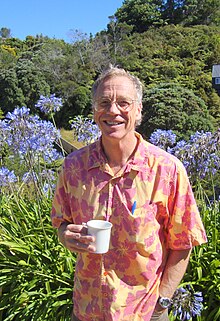Michael Freedman
Michael Freedman | |
|---|---|
 Michael Freedman in 2010 | |
| Born | Michael Hartley Freedman April 21, 1951 (age 73) |
| Nationality | American |
| Alma mater | Princeton University University of California, Berkeley |
| Known for | Work on the Poincaré conjecture in dimension 4 |
| Awards | Sloan Fellowship (1980) MacArthur Fellowship (1984) Oswald Veblen Prize in Geometry (1986) Fields Medal (1986) National Medal of Science (1987) Guggenheim Fellowship (1994) |
| Scientific career | |
| Fields | Mathematics and condensed matter physics |
| Institutions | Microsoft Station Q UC Santa Barbara UC San Diego Institute for Advanced Study UC Berkeley |
| Doctoral advisor | William Browder |
| Doctoral students | Ian Agol Feng Luo |
Michael Hartley Freedman (born 21 April 1951) is an American mathematician, at Microsoft Station Q, a research group at the University of California, Santa Barbara.[1] In 1986, he was awarded a Fields Medal for his work on the Poincaré conjecture. Freedman and Robion Kirby showed that an exotic R4 manifold exists.
Life and career
Freedman was born in Los Angeles, California, U.S. His father, Benedict Freedman, was an aeronautical engineer, musician, writer, and mathematician.[2] His mother, Nancy Mars Freedman, performed as an actress and also trained as an artist.[3] His parents cowrote a series of novels together. He entered the University of California, Berkeley, in 1968, and continued his studies at Princeton University where he received Ph.D. degree in 1973 for his doctoral dissertation titled Codimension-Two Surgery, written under the supervision of William Browder. After graduating, Freedman was appointed a lecturer in the Department of Mathematics at the University of California, Berkeley. He held this post from 1973 until 1975, when he became a member of the Institute for Advanced Study (IAS) at Princeton. In 1976 he was appointed assistant professor in the Department of Mathematics at the University of California, San Diego (UCSD). He spent the year 1980/81 at IAS, returning to UCSD, where in 1982 he was promoted to professor. He was appointed the Charles Lee Powell chair of mathematics at UCSD in 1985.
Freedman has received numerous other awards and honors including Sloan and Guggenheim Fellowships, a MacArthur Fellowship and the National Medal of Science. He is an elected member of the National Academy of Sciences, and a fellow of the American Academy of Arts and Sciences and of the American Mathematical Society.[4] He currently works at Microsoft Station Q at the University of California, Santa Barbara, where his team is involved in the development of the topological quantum computer.
Publications
- Freedman, Michael Hartley (1982), "The topology of four-dimensional manifolds", Journal of Differential Geometry, 17 (3): 357–453, ISSN 0022-040X, MR 0679066
- Michael H. Freedman and Frank Quinn, Topology of 4-manifolds, Princeton Mathematical Series, vol 39, Princeton University Press, Princeton, NJ, 1990. ISBN 0-691-08577-3
- Freedman, Michael H.: Z2-systolic-freedom. Proceedings of the Kirbyfest (Berkeley, CA, 1998), 113–123 (electronic), Geom. Topol. Monogr., 2, Geom. Topol. Publ., Coventry, 1999.
- Freedman, Michael H.; Meyer, David A.; Luo, Feng: Z2-systolic freedom and quantum codes. Mathematics of quantum computation, 287–320, Comput. Math. Ser., Chapman & Hall/CRC, Boca Raton, FL, 2002.
References
- ^ Microsoft Station Q Group at UCSB. (Template:Wayback)
- ^ Nelson, Valerie J. (March 4, 2012), "Benedict Freedman dies at 92; author and Occidental professor", Los Angeles Times.
- ^ McLellan, Dennis (August 22, 2010), "Nancy Freedman dies at 90; feminist had long and wide-ranging literary career", Los Angeles Times.
- ^ List of Fellows of the American Mathematical Society, retrieved 2012-12-29.
External links
- Members of the United States National Academy of Sciences
- 20th-century American mathematicians
- 21st-century American mathematicians
- Fields Medalists
- Guggenheim Fellows
- National Medal of Science laureates
- MacArthur Fellows
- Microsoft technical fellows
- University of California, Santa Barbara faculty
- Princeton University alumni
- 1951 births
- Living people
- People from Los Angeles, California
- Fellows of the American Mathematical Society
- Fellows of the American Academy of Arts and Sciences
- Sloan Fellows
